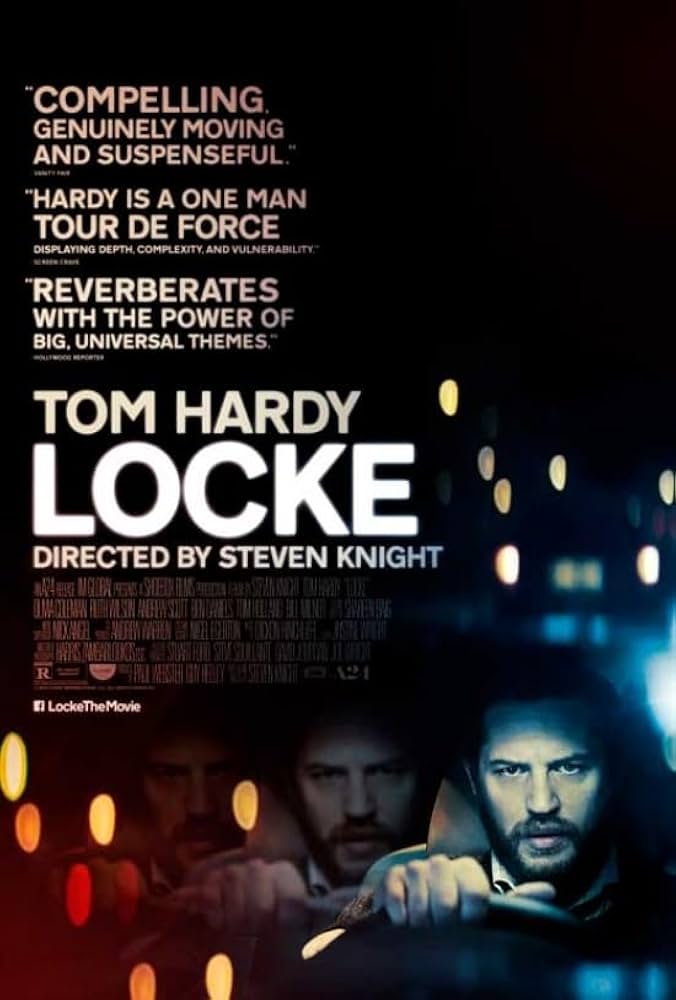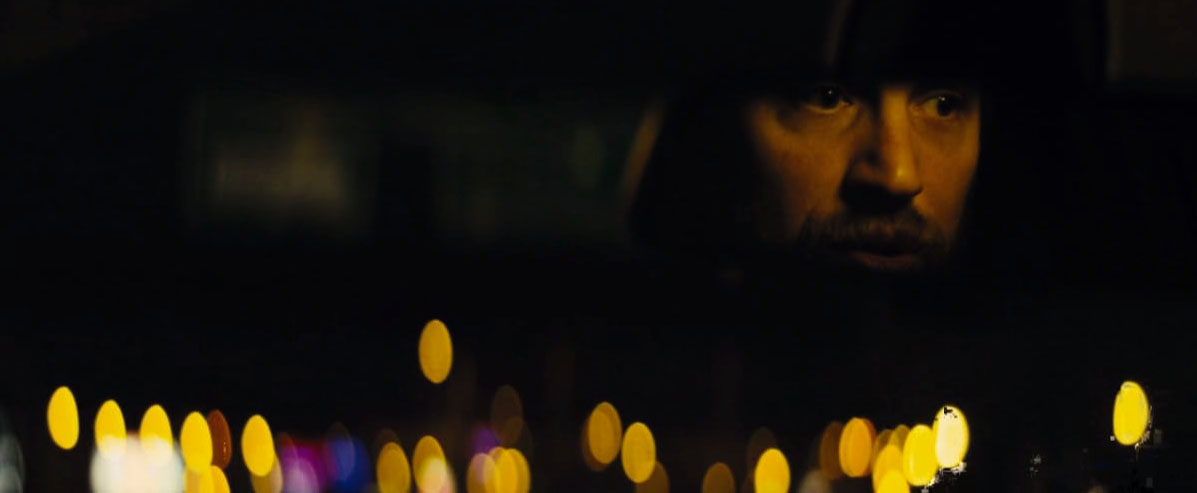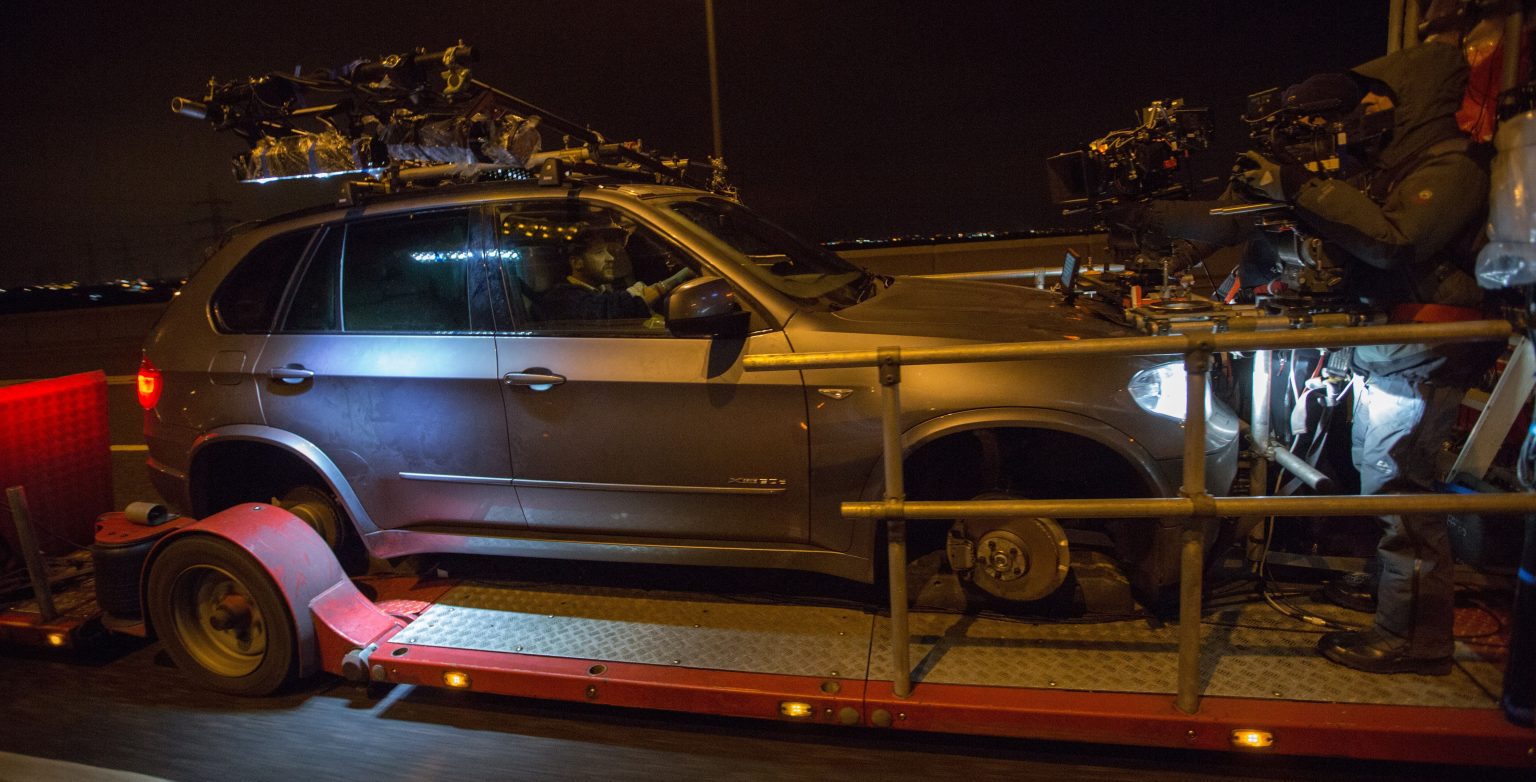Starring: Tom Hardy, Olivia Coleman, Ruth Wilson, Andrew Scott, Tom Holland and Bill Milner
Written and Directed by: Steven Knight
Rated: R
Running Time: 1hr 25min
WINNER – Los Angeles Film Critics Association Awards – Best Actor (Tom Hardy)
WINNER – National Board of Review – Top Ten Independent Films
WINNER – British Independent Film Awards – Best Screenplay (Steven Knight)
NOMINEE – British Independent Film Awards – Best Actor (Tom Hardy)
NOMINEE – British Independent Film Awards – Best Technical Achievement (Justine Write (Editing))
“I wanted to do something about an ordinary man, who isn’t Jason Bourne or James Bond. He’s a very ordinary man and he’s made a mistake.” – Writer/Director Steven Knight – THE PLAYLIST
Earning less than $1.5 million during its initial run, it’s easy to understand why filmmaker Steven Knight’s 2013 film LOCKE wasn’t a bigger hit at the box office. Hearing that the film follows a lone man in his car for an hour and a half, doing nothing but talking on a phone, sounds incredibly dull. Unlike Steven Spielberg’s thriller DUEL, which also spends most of its time with a single man confined to his car, LOCKE doesn’t benefit from the addition of an external element like a terrifying truck stalking the main character. Instead, it’s a quiet character-driven drama with no real physical danger looming in the background to build tension. It’s basically one man, driving his car and talking to some people on his phone. Yet, if anyone avoids the film based on this description, they’re missing something incredibly special. Beneath this simple setup lies a well-crafted story that reveals some genuine emotional truths while also exploring the moral struggles the protagonist must face while deciding to take responsibility for a bad decision he made not that long ago.
The story begins with a man named Ivan Locke, who is literally at a crossroads. He sits in his car at a stoplight facing a life-altering decision about which road to take. If he turns left, he can avoid confronting the situation he created seven months earlier and keep his secret hidden from those he loves for a little longer. However, if he turns right, he will be forcing himself to do what he believes is right: admitting his mistake to those around him and risking everything he considers important in his life, all while taking responsibility for a past transgression. Of course, this being a movie, the choice, though hard for Locke, is a simple one for the screenwriter. Locke takes the road to the right, starting his journey of self-discovery, where he must confront his own inner struggles while slowly watching every aspect of his life, work and personal, fall apart in a way that he may not be able to recover from.
Having directed only a handful of features, filmmaker Steven Knight is probably best known by many for his work as a screenwriter. In the past, he has written films such as David Cronenberg’s fascinating EASTERN PROMISES and Stephen Frears’ forgotten DIRTY PRETTY THINGS, for which he was nominated for an Academy Award. His masterful skill as a writer is on full display here, as the script is filled with well-written characters who, although we never see most of them on screen and only hear their voices as they talk to Ivan over the phone, are well-developed and come alive with genuine depth. The story unfolds at an even pace, revealing things in an interesting order that helps keep the viewer captivated and, if they’re anything like me, on the edge of their seat, wondering how it will all turn out.
Knight’s daring choice to keep the entire film contained within the confines of a single car while never cutting to the people on the other side of the phone is an interesting one. In lesser capable hands, a stylistic choice like this can easily feel more like a gimmick than a natural part of the storytelling process. Fortunately, Knight’s use of a single location is well-executed and works effectively as an extension of the script’s themes. Not only does it create the obvious claustrophobic feel of the walls closing in on the film’s lead, but it also gives the viewer a sense that they, along with Locke, are effectively trapped in the situation. Sitting in the car, or even more specifically, belted into the driver’s seat, Locke can’t run or hide from the situation that he finds himself in. He is forced to sit in one spot, staring out at the road he has chosen to travel, taking the phone calls as they come in and answering the questions that demand to be answered.
Knight also does a nice job of creating a unique atmosphere that keeps everything moving forward at a steady pace, allowing the story to never get bogged down or boring. According to IMDB, “The movie had an unconventional shooting schedule. Tom Hardy filmed his part over six nights, with three cameras rolling, shooting the movie twice per night as it was filmed in a single take. The other actors were in a hotel room, speaking on the phone with Hardy, who was on location. After the actors wrapped their parts, there were an additional two nights of pickup shots.” Knight’s use of cinematographer Haris Zambarloukos’ creative visual style gives the small space a genuine cinematic feel, which is quite impressive. Mixing exterior shots with the reflections of the outside city/traffic lights superimposed on top of both Locke’s face and the car’s windows allows the visual style of the film to stay interesting while the well-paced editing by Justine Wright, who should have been nominated for an Oscar that year, brings it all together at a perfect pace.
Ultimately, the success of the film relies on Tom Hardy’s portrayal of Locke. His character is literally the only face we see throughout the entire movie and everything hinges on whether the audience believes him to be genuine with his intentions. He is a flawed man with whom the viewer must sympathize with, even though it’s his own fault that he’s in the situation he now faces. Locke is a complex character whose life gradually unravels over a period of 85 minutes and Hardy plays every emotional beat with an authentic honesty, allowing us to empathize with him, even if we don’t like what he’s done. He is a man who wants to do the right thing by everyone, only to realize that it might be too late. Hardy’s performance has a subtle calmness to how he speaks as Locke tries to stay in control of every phone call he encounters, while his facial expressions give away his true inner struggles. And let us not forget that Hardy must convey everything while trapped in a car, only being able to move his head and hands. It’s a powerful performance that effectively communicates all the inner emotions of a man whose life is literally falling apart because of a single mistake that he has kept hidden.
The supporting cast is also strong across the board. The characters they portray are all relatable in their emotions as they also struggle with the chaos that the night’s revelations have caused. What makes this even more impressive is that these performances are entirely created through voice-over. Since the actors are never seen, they are not given the opportunity to use either facial expressions or body language to convey the full range of emotions that each character goes through. They are completely represented by the words they say and the tone in which they speak, making it even more impressive that the characters are given so much depth and feel so real.
Ultimately, LOCKE is the kind of film that shouldn’t work. However, it does. Fortunately, this particular story found itself in the capable hands of a writer/director who understood how to put all of the pieces together in a thrilling and often emotional manner. As the closing credits began to roll, I personally noticed something remarkable about my own viewing experience: while watching this movie, in which a man never leaves the confines of his car, I was still literally on the edge of my seat for the whole experience.
Watch LOCKE
You May Also Like



